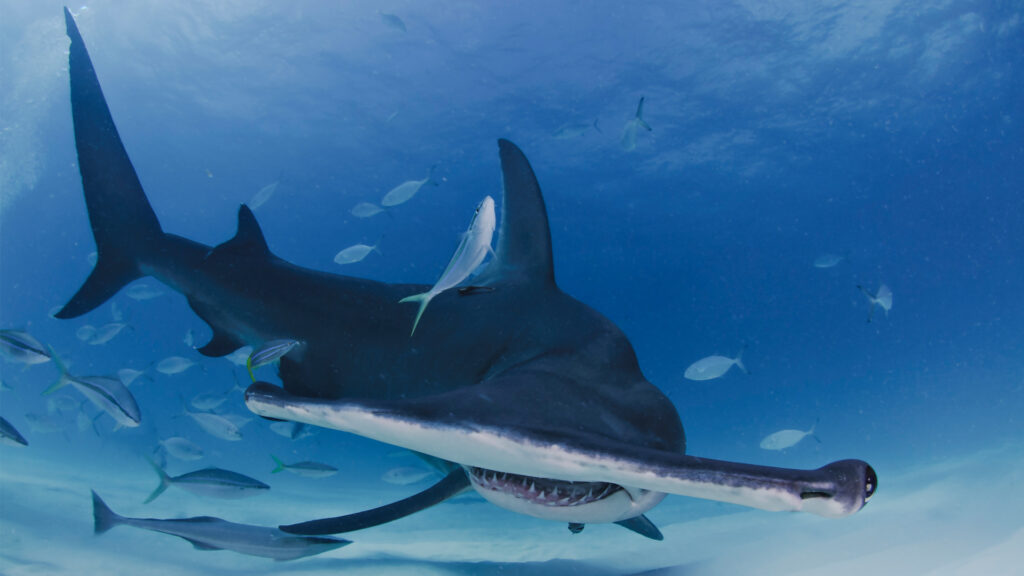By Jaime Biton
As I stared down at the water of the Atlantic Ocean, I thought to myself that it looked unnaturally crystal clear. The waves weren’t perfect, but as every surfer in Miami knows, you surf any chance you get. Surfers are also aware of something else: the predators of the sea.
Toward the end of my surf session, I saw a fin in the distance, “Oh, look at that dolphin,” someone said. It’s not unheard of, so I paid no attention. But this dolphin began to swim closer. Eventually, it was within 10 feet of me.
I thought that it was just curious, still paying no attention to how it was swimming. Within 5 feet, I could finally catch a glimpse of the animal swimming toward me. When it was 2 feet away, I processed that I was next to a behemoth.
With a body twice the size of mine, I instantly lifted my legs from the water, as the soft body of a hammerhead shark grazed the tip of my foot.

This close call with a shark is unusual. Not because I almost lost my limb, but due to the time in which it occurred. It was a cool day in February, a time when I thought sharks were migrating away from Miami to warmer waters. Hammerheads are specifically known to migrate to Bimini and the Bahamas during these months.
However, with warming temperatures, shark migration is not what it used to be. Sharks are ectothermic, meaning they cannot generate and maintain their body heat. Thus, sharks are forced to venture into new locations as the water begins to warm due to climate change. These places are not prepared for a mass migration of large predators, which disrupt and destroy the already fragile ecosystems in place.
For example, Monterey Bay, California, is home to many beloved otters. Otters are crucial to the Monterey Bay ecosystem as they forage for sea urchins, which prevents the destruction of the kelp forest in the area.
Now sharks are beginning to appear in Monterey Bay, traveling from the warmer waters of the south. The taste of helpless otters used to be foreign to many predator sharks, but otters have started to become sharks’ next meal.
Due to their fearsome reputation, caused by Hollywood movies such as “Jaws,” the initial solution may seem to be to kill sharks and lower their population. But this would only worsen the issue. Marine biologist Robert Day explains that sharks are intertwined with the ocean’s health, and if shark numbers dwindle, then the ocean itself goes off balance.
We cannot blame the sharks for their actions. After all, they are born to be predators. It would also be a diversion from the true issue: climate change.
Climate change isn’t just about humanity. In the grand scheme of our great Earth, we are only a small part of what is beautiful and worth saving. Moreover, even if humanity can adapt to the changing climate, sharks cannot. Sharks are slow-evolving creatures, meaning as their ecosystems continue to change due to climate change, sharks struggle to adapt to them.
In addition, the ocean itself is crucial to maintaining stability within our world. By absorbing almost 30% of the anthropogenic carbon dioxide, the ocean holds almost 60 times the amount of carbon in the atmosphere. Yet, as the world’s carbon production continues to rise, our seas only have a limited amount they can store.

Climate change has an immediate effect on marine life and human safety. If we do not do something now, then there will be irreparable damage to our underwater ecosystem.
It is not too late to save our oceans, but every day more sharks will continue to ravage new ecosystems. So, what can we do? Despite our constant blame for the inaction of our politicians, there are actual ways to save our underwater ecosystem.
In Miami, the nonprofit organization Miami Waterkeeper is doing its absolute its best to maintain and improve the South Florida underwater ecosystem. On a larger scale, organizations such as Oceana are protecting our water worldwide. Oceana is the largest international advocacy organization with the only goal to protect the ocean.
By volunteering and advocating for our oceans, we are not only helping but we are also showing the world that we care. We would be forcing the politicians to take action as well, creating a culture and society of protection, not production.
Jaime Biton is a Miami native who is a sophomore at Columbia University.
If you are interested in submitting an opinion piece to The Invading Sea, email Editor Nathan Crabbe at ncrabbe@fau.edu. Sign up for The Invading Sea newsletter by visiting here.




The World is changing at speeds not seen in 66 million years. The planet will not be destroyed . Life forms unable to adapt as with the majority of life went extinct. That will be our fate if we don’t change.